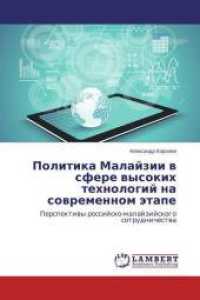- ホーム
- > 洋書
- > 英文書
- > Politics / International Relations
Full Description
DECOLONISING GEOGRAPHY? "This book presents an extraordinarily sensitive account of geography's histories in five African countries subjected to British colonial rule. Craggs and Neate draw together political and imaginative processes of decolonisation, through an innovative biographical approach that humanizes and enlivens the story of our academic discipline. It will be an invaluable resource for those seeking a deeper understanding of decolonisation, its recent trajectories and far-reaching implications, on the African continent."
—Shari Daya, Affiliate Associate Professor in Environmental and Geographical Science, University of Cape Town
"By placing the experiences, ideas, and practices of African geographers in the center of their analyses, Craggs and Neate provide an unprecedented account of historical and contemporary decolonizing struggles within Geography and the academy. This book should be required reading for all those looking to decolonize the discipline and dislodge it from its Global North histories, institutions, and ideologies."
—Mona Domosh, Professor of Geography, The Joan P. and Edward J. Foley Jr. 1933 Professor, Dartmouth College
"This meticulous work explores how colonialism, decolonization and postcolonialism shaped African geography and geographers. It sheds light on efforts to 'Africanize' the discipline, a process which I was both witness to and a participant in."
—Stanley Okafor, Professor of Geography (Retired), University of Ibadan
How did a generation of academic geographers engage with constitutional decolonisation during the end of the British empire in Africa? In Decolonising Geography? Disciplinary Histories and the End of the British Empire in Africa, 1948-1998, Ruth Craggs and Hannah Neate explore how the teaching, research, administration and activism of geographers in Africa shaped the discipline and the post-colonial geopolitics of the continent. The authors follow the professional lives of individual geographers to provide fresh insights into decolonisation in the former British Empire in Africa, drawing from extensive archival research and more than 40 oral history interviews with geographers in Ghana, Nigeria, South Africa, Tanzania and the UK. Decolonising Geography is a must-read for any reader in the UK and Africa with an interest in the relationships between geography and decolonisation.
Contents
List of Figures and Table viii
Acknowledgements x
1. Decolonisation and Geography in Africa 1
Introduction 1
African Decolonisation 3
Periodisation 3
Decolonisation, Education, and the Place of African Universities 5
Contributions 10
Historicising Current Debates 10
Decolonising Geography's Histories 13
Professional Lives and Histories of Decolonisation 16
Biographical Methods 19
Sources 20
Case Studies 24
Structure 30
2. 'New, Interesting, and Even Exciting Opportunities': Geography and the Founding of Colonial Universities in Africa 42
Introduction 42
Asquith Colleges and the 'Imperial Family of Universities' 44
Geography at the Asquith Colleges: Colonial Networks 46
Early Faculty 47
Building a Department 54
Teaching and Researching Geography 58
Campus Relations 60
Conclusion 66
3. Shifting the Centre: Africanising Geography in Decolonisation 73
Introduction 73
African Geography Students in Britain 76
Shifting Higher Education Structures 82
Africanisation of Staff 89
Africanisation of Research, Curriculum, and Teaching 95
Conclusion 103
4. International Networks, Decolonisation, and the Cold War 110
Introduction 110
Diversifying Influences and Americanisation 113
Looking to America 113
American Orbits 115
The Quantitative Revolution in Africa 117
Other Eastern and Non-aligned Networks 121
Eastern Bloc Connections 121
Moving the Centre 122
Radical Geography and Underdevelopment 125
Conclusion 131
Mobility -- for Some 131
Decolonisation or Incorporation? 132
Innovation 134
5. Geography and National Development: Knowing, Planning, and Exploiting Resources for Independent Africa 142
Introduction 142
Geography and African Development 145
Producing Development Experts 146
Knowing New Nations (and Resources) through the Census 150
Research for Rural Development in Tanzania 154
BRALUP and Applied Research 154
Research for Ujamaa 156
Between Commitment and Critique 159
Regional Development Planning and New Urban Spaces in Nigeria 161
Rebalancing After War 161
Akin Mabogunje and the Geographer as Consultant 162
Conclusion 167
6. Geography, Apartheid and Anti-Apartheid Activism in South Africa 175
Introduction 175
Departmental Spaces, Geography and the Contestation of Apartheid 177
The Tearoom 178
Conference Spaces 179
contents vii
Teaching Spaces 180
Campus Politics and Activism 183
Campus Protests 183
Geographers as Activists Beyond Campus 187
Geographical Research and Apartheid 190
Research for (Separate) Development in South Africa 190
Apartheid: An Absent Subject 192
Growing Critique 195
People's Geography 196
Decolonising South African Geography 198
Working for Transformation 200
Challenging Geography's White Institutions 200
Consultancy and Critique 205
Conclusion 207
7. Legacies of Decolonisation in African and British Geography 217
Introduction 217
Leaving Africa 219
Pastures New 219
Reluctance and Compulsion 221
Isolation and Creativity 225
Growing Isolation 225
Solidarity and Creativity 228
Legacies in the UK 229
Textbook Africa 230
Area Studies, Development Studies, and Development Geography 232
African Connections, Colonial Nostalgia 235
Conclusion 241
8. Decolonising Geography Past and Present? 250
Introduction 250
Decolonisation, its Histories and Geographies 250
Peopling the Historiography of Decolonisation 250
Decolonising Geography's Histories 251
Learning from the Past 253
To What Extent was Geography Decolonised in the period 1948--1998? 253
What Does This Mean for Decolonisation Struggles Today? 257
Conclusion 264
Index 269







